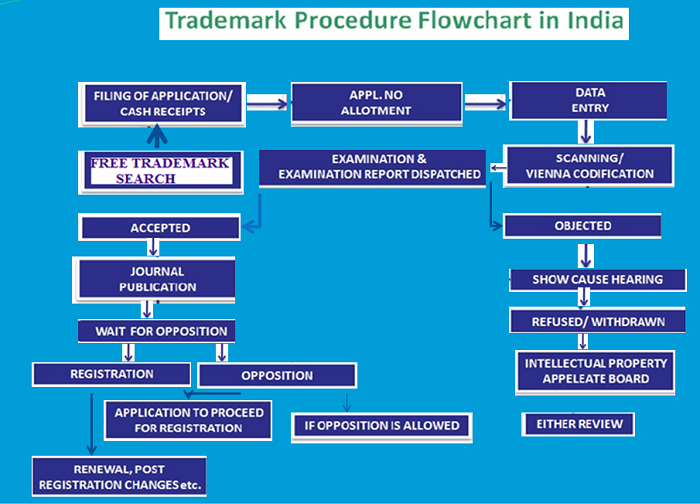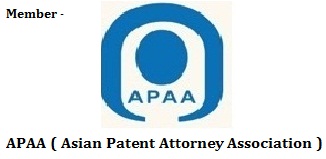Trademark Registration Process and Procedure in India
Trade Mark Law in India: Trademark Application
A Trademark is any sign which can distinguish the goods and services of one trader from those of another. A sign includes words, logos, colors, slogans, three-dimensional shapes and sometimes sounds and gestures.
A trademark is, therefore, a ‘badge’ of trade origin. It is used as a marketing tool so that customers can recognize the product of a particular trader. To be registrable in India it must also be capable of being represented graphically, that is, in words and/or pictures.

1.Changes In The Indian Trade Mark Law
A new Trademark regime has been introduced in India since September 15, 2003. The new Trade Marks Act, 1999 has many innovative features:
[1] Service Marks: A mechanism is now available to protect marks used in the service industry. Thus businesses providing services like computer hardware and software assembly and maintenance, restaurant and hotel services, courier and transport, beauty and health care, advertising, publishing, educational and the like are now in a position to protect their names and marks.
[2] Collective Marks: Marks being used by a group of companies can now be protected by the group collectively.
[3] Well-known marks: Marks, which are deemed to be well known, are defined. Such marks will enjoy greater protection. Persons will not be able to register or use marks, which are imitations of well-known trademarks.
[4] Enlarged scope of registration: Persons who get their marks registered for particular goods in a particular class and commence using their marks can sue and prevent other persons from
(i) Using the same or similar marks even for different goods falling in other classes;
(ii) Using the same or similar marks even only as part of their firm name or company name;
(iii) Using the same or similar mark only in advertising or on business papers;
(iv) Importing or exporting goods under the said trade mark;
(v) Unauthorized oral use of the said trademark.
[5] Stringent punishment: Punishment for violating a trademark right has been enhanced. The offence has now been made cognizable and wide powers have been given to the police to seize infringing goods. At the same time, the power of the Courts to grant ex parte injunctions have been amplified.
[6] Appellate Board: An appellate board (IPAB) has been constituted based in Chennai for speedy disposal of Appeals and rectification applications.
[7] Expedited procedure: Mechanisms have been set in place for expediting search and registration by paying five times the normal fee.
[8] Enhanced renewal period: Registered trademarks need to be renewed every ten years.
[9] License agreements do not need to be compulsorily registered.
[10] Marks may include the shape of goods.
[11] Marks may include a combination of colors.
The law is based mainly on the United Kingdom Trade Marks law and provides for the registration of trademarks which are being used, or which will be used, for certain goods to indicate a connection between them and some person who has the right to use the marks with or without any indication as to the identity of the person.
2. Filing a Trademark Registration in India
Application for registration: An application for registration may be made by any person claiming to be the proprietor of a mark but only as regards the particular goods or service in respect of which he/she is using or proposing to use the mark. At the time of filing the application, the proprietor must have the intention to use the mark himself/herself or though a registered user.
Foreigners and nationals not living in the country: May be recorded as being registered proprietors of trademarks but they must provide the Registry with an address for service in India, otherwise, they must appoint a registered agent or representative.
Registrability: To be registrable, a trademark application must contain or consist of the following essential particulars:
The name of a company, individual or firm represented in a special or particular manner;
The signature of the applicant for registration or some predecessor in his/her business;
One or more invented words;
One or more words having no direct reference to the character or quality of the goods and not being, according to its ordinary signification, a geographical name, or a surname, or a personal name, or any common abbreviation thereof, or the name of a sect, caste or tribe in India;
Any other distinctive mark. No trademark shall be registered in respect of analgin, aspirin, chloropromazine, ferrous sulfate, piperazine and its salts such as adipate, citrate, and phosphate or for a new single ingredient drug first introduced in India. The Indian national flag, the name or pictorial representation of Mahatma Gandhi, Jawahar Lal Nehru, Chatrapati Shivaji, or the Prime Minister of India and the names and emblems of certain international organizations may not be registered as trade marks. In the case of portraits, the name of the person depicted must be stated.
Service marks:
Registerable in India in eight classes
Priority:
Can be claimed from the earliest corresponding application in a Convention country provided that application is filed in India within six months of the priority date. Multiple and partial priorities are allowed.
Classification:
The international classification of goods is used and separate applications must be filed for goods falling in different classes. Classes 1 to 45 are available.
Territory Covered:
The trademark legislation covers the whole of the territory of India as at present constituted, including the States of Jammu and Kashmir and the territories of Goa, Daman, Diu, Dadra, Nagar Haveli and Pondicherry.
3. Examination
Applications are examined to ensure that they comply with the requirements of the law and that they do not conflict with marks which are already registered, or which are the subjects of earlier pending applications.
4. Granting, Protection Opposition
Applications which have been accepted are advertised in the Trade Marks Journal and opposition may be filed within three months of the date of advertisement; an extension of time of one month for filing opposition may be obtained upon application.
Duration of registration:
Renewal fees:
Ten years, renewable for further periods of ten years each: Must be paid before but not more than six months before the date of expiry of the last registration; a mark may be restored within one year from the last date of renewal upon application to the Registrar, either completely or subject to such conditions and limitations as he/she may think fit to impose. A trademark which has been removed from the Register for non-payment of renewal fees can be cited against an application for registration during a period of one year as from the date of removal.
Infringement: Suits may be filed against the infringement of registered marks and in any suit, registration may be regarded as valid in all respects even years from the date of registration. Unregistered trademarks with a reputation in India or internationally well-known trademarks, can be protected against misuse in a passing off action.
Service Mark India: Service Mark Application & Litigation: The Trade Marks Act, 1999 has come into force from the 15th of September 2003. An important feature of the Act is the introduction of the registration of Service Marks in India. Previously, Service Mark registration in India was not allowed. Protection of service marks was available only under the Common Law. From September 2003, it has now become possible to separately register and therefore statutorily protect Service Marks.
Service Marks: Service Marks are marks used in any form of service business where actual goods under that mark are not traded. For instance, a Hotel or a restaurant is a service: under the marks Wellcome group, Taj, Oyo, no goods are traded, but services are offered and purchased, these marks will now be statutorily protected under the Act. Similarly, marks for software services or business process outsourcing services, or health, insurance, repair services or airlines services or educational services can be protected by registration.
Scientific & technological services, research & design; industrial analysis & research services; design & development of computer hardware & software; legal services. Services for providing food & drink; temporary accommodation. Medical services; veterinary services; hygienic and beauty care for human beings or animals; agriculture, horticulture, and forestry services. Personal and social services rendered by others to meet the needs of individuals; security services for the protection of property and individuals.
These are general classes. Each class has hundreds of entries for services falling under a class. Thus, for instance, Compilation of information into computer databases is a service falling in class 35 but a service for providing financial information is a service falling in class 36. Again, a service providing Installation, maintenance, and repair of Computer hardware falls in class 37 but Installation and Maintenance of Computer software falls in class 42. Class 43 covers hotel and restaurant services. Medical clinics and Beauty parlors fall in class 44 and horoscope casting in class 45.


